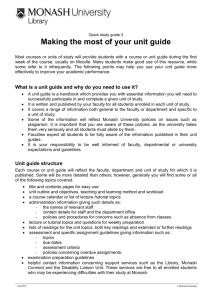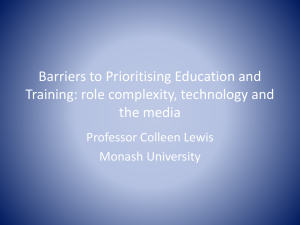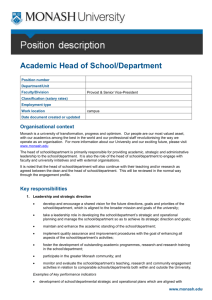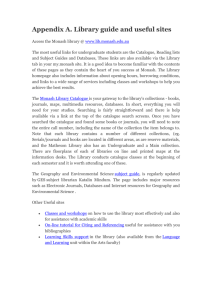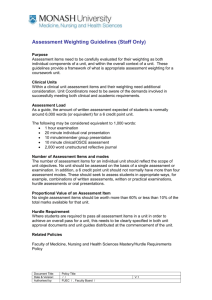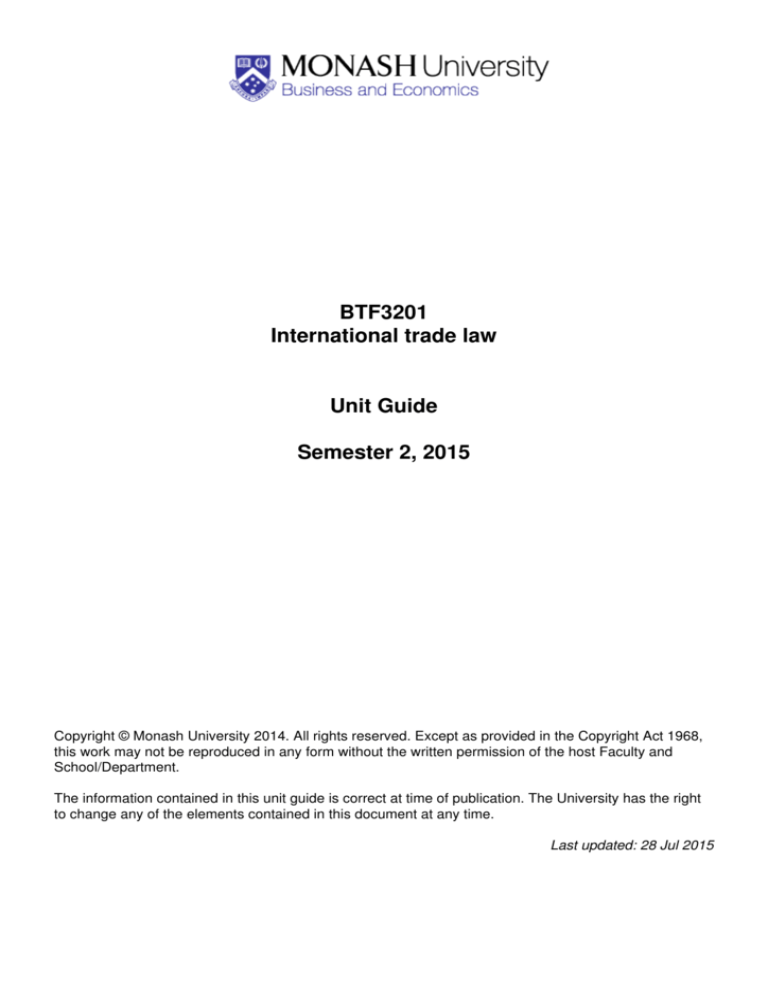
BTF3201
International trade law
Unit Guide
Semester 2, 2015
Copyright © Monash University 2014. All rights reserved. Except as provided in the Copyright Act 1968,
this work may not be reproduced in any form without the written permission of the host Faculty and
School/Department.
The information contained in this unit guide is correct at time of publication. The University has the right
to change any of the elements contained in this document at any time.
Last updated: 28 Jul 2015
Table of Contents
BTF3201 International trade law - Semester 2, 2015..............................................................................1
Mode of Delivery..............................................................................................................................1
Workload requirements....................................................................................................................1
Additional workload requirements........................................................................................1
Unit Relationships........................................................................................................................................1
Prerequisites....................................................................................................................................1
Prohibitions......................................................................................................................................1
Chief Examiner(s)........................................................................................................................................1
Campus Lecturer(s).....................................................................................................................................2
Caulfield...........................................................................................................................................2
Tutor(s)........................................................................................................................................................2
Caulfield...........................................................................................................................................2
Your feedback to Us....................................................................................................................................2
Previous Student Evaluations of this Unit....................................................................................................2
Academic Overview...................................................................................................................................3
Learning Outcomes.........................................................................................................................3
Unit Schedule.............................................................................................................................................4
Teaching Approach..........................................................................................................................4
Assessment Summary.....................................................................................................................5
Hurdle Requirements...........................................................................................................5
Second marking...................................................................................................................5
Return of final marks............................................................................................................5
Exam viewing.......................................................................................................................5
Assessment criteria..............................................................................................................6
Assessment Requirements......................................................................................................................7
Assessment Tasks...........................................................................................................................7
Participation.........................................................................................................................7
Assessment task 1...............................................................................................................7
Examination(s).............................................................................................................................................8
Examination 1..................................................................................................................................8
Learning resources......................................................................................................................................9
Feedback to you..........................................................................................................................................9
Extensions and penalties.............................................................................................................................9
Returning assignments................................................................................................................................9
Referencing requirements...........................................................................................................................9
Assignment submission...............................................................................................................................9
Hard copy submission.....................................................................................................................9
Online submission...........................................................................................................................9
Prescribed text(s) and readings.....................................................................................................10
Recommended Resources........................................................................................................................10
Recommended text(s) and readings..............................................................................................10
Examination material or equipment...........................................................................................................10
Other Information....................................................................................................................................11
Policies..........................................................................................................................................11
Graduate Attributes Policy.................................................................................................11
Student Charter.........................................................................................................................................11
Student services........................................................................................................................................11
Monash University Library.........................................................................................................................11
Moodle 2....................................................................................................................................................12
Disability Liaison Unit................................................................................................................................12
BTF3201 International trade law - Semester 2, 2015
The law affecting Australian enterprises engaged in international business. Topics include international
trade conventions; import and export procedures; carriage of goods by sea and air; bills of lading and the
Hague-Visby rules; finance of international trade; payment and documentary credits; the use of
negotiable instruments in international trade; international commercial arbitration and marine insurance.
Mode of Delivery
Caulfield (Day)
Workload requirements
Minimum total expected workload to achieve the learning outcomes for this unit is 144 hours per
semester typically comprising a mixture of scheduled learning activities and independent study.
Independent study may include associated readings, assessment and preparation for scheduled
activities. The unit requires on average three/four hours of scheduled activities per week. Scheduled
activities may include a combination of teacher directed learning, peer directed learning and online
engagement.
See also Unit timetable information
Additional workload requirements
BTF3201 is a six credit point unit. The total time commitment expected for this unit is 144 hours. In
addition to 36 hours of class contact (three hours each week for twelve weeks), students should plan to
spend additional 108 hours during the semester in study for this unit. This includes time spent in
preparing for and completing assessment tasks, together with time spent in general study, revision and
examination preparion.
Unit Relationships
Prerequisites
BTF1010 or equivalent
Prohibitions
BTC2190, BTG3201, BTW3201
Chief Examiner(s)
Dr Haemala Thanasegaran
1
BTF3201 International trade law - Semester 2, 2015
Campus Lecturer(s)
Caulfield
Dr Nicola Charwat
Campus: Caulfield
Phone: +61 3 990 31564
Email: Nicola.Charwat@monash.edu
Contact hours: Monday 1-3, Thursday 1-2
Dr Haemala Thanasegaran
Contact hours: Monday 12-1, Wednesday 2-3
Prof. Chris Arup
Contact hours: TBA
Tutor(s)
Caulfield
Dr Haemala Thansegaran
Contact hours: Monday 12-1, Wednesday 2-3
Your feedback to Us
Monash is committed to excellence in education and regularly seeks feedback from students, employers
and staff. One of the key formal ways students have to provide feedback is through the Student
Evaluation of Teaching and Units (SETU) survey. The University’s student evaluation policy requires that
every unit is evaluated each year. Students are strongly encouraged to complete the surveys. The
feedback is anonymous and provides the Faculty with evidence of aspects that students are satisfied
and areas for improvement.
For more information on Monash’s educational strategy, see:
www.monash.edu.au/about/monash-directions/ and on student evaluations, see:
www.policy.monash.edu/policy-bank/academic/education/quality/student-evaluation-policy.html
Previous Student Evaluations of this Unit
SETU feedback confirms that students find this unit intellectually stimulating and that students are highly
satisfied with the quality of the unit. Staff continually review the unit in response to student feedback.
Examples of changes made in response to SETU feedback include, the introduction of a marking
feedback sheet to ensure that students are provided with a clear indication of where they can improve
their written work. Student feedback also contributed to the decision to run the unit in lecture/tutorial
format to improve quality of class participation.
If you wish to view how previous students rated this unit, please go to
https://emuapps.monash.edu.au/unitevaluations/index.jsp
2
Academic Overview
Learning Outcomes
The learning goals associated with this unit are to:
1. define the purpose and scope of the international legal framework in which trade between nations
takes place
2. be able to recognise and understand the form and nature of documents used in international
trade including contracts of sale, shipping documentation, invoices, insurance policies, bills of
exchange, documentary collections and letters of credit
3. be able to identify and understand legal issues in an international trade context
4. be able to apply the laws relating to international contracts of sale, international carriage of goods
and finance of international trade in a variety of situations
5. be able to write a coherent piece of advice discussing the legal issues arising in an international
trade dispute.
3
Unit Schedule
Week
Activities
0
Assessment
No formal assessment or activities are
undertaken in week 0
1
Introduction to the unit and international trade law (Dr
Nicola Charwat)
No tutorial
2
The international trading system I (Professor Chris
Arup)
weekly tutorial participation is assessed
3
The international trading system II (Professor Chris
Arup)
weekly tutorial participation is assessed
4
International contracts for the sale of goods I (Dr
Nicola Charwat)
weekly tutorial participation is assessed
5
International contracts for the sale of goods II (Dr
Nicola Charwat)
weekly tutorial participation is assessed
6
Contracts for the international carriage of goods by
sea I (Dr Haemala Thanasegaran)
Assignment 1 due date: Friday 4
September 12pm. And,weekly tutorial
participation is assessed
7
Contracts for the international carriage of goods by
sea II (Dr Haemala Thanasegaran)
weekly tutorial participation is assessed
8
Marine Insurance (Dr Haemala Thanasegaran)
weekly tutorial participation is assessed
9
Air carrier liability for international carriage of goods by weekly tutorial participation is assessed
air (Dr Nicola Charwat)
10
International payments (Dr Haemala Thanasegaran)
weekly tutorial participation is assessed
11
International dispute resolution (Dr Haemala
Thanasegaran)
weekly tutorial participation is assessed
12
Revision (Dr Haemala Thanasegaran)
weekly tutorial participation is assessed
SWOT VAC
No formal assessment is undertaken
SWOT VAC
Examination period
LINK to Assessment Policy:
http://policy.monash.edu.au/policy-bank/
academic/education/assessment/
assessment-in-coursework-policy.html
Teaching Approach
Seminars
This unit will provide you with the skills and knowledge needed to solve practical problems arising in the
everyday world of international trade.
The unit is taught via a weekly two hour lecture and one hour seminar. It relies on an enquiry and
problem-based learning approach. You are expected to actively partipate in class discussions and class
exercises. You are expected to come to lectures and tutorials prepared. This means we expect you to
have read the prescribed weekly reading, completed any preparation as directed by your tutor and
lecturer and attempted the tutorial problems for the topic. In addition to utilising the lecture materials,
your preparation should also include independent reading of the essential materials and recommended
4
Unit Schedule
resources. Relying on lecture materials is not sufficient. You will not be provided with model answers to
the tutorial problems. The class discussions of the tutorial problems provide you with an opportunity to
check and improve your own pre-prepared responses to the seminar problems.
Because this unit highlights peer assisted learning, students are expected to work in groups throughout
the semester, as well as individually. Working in groups will contribute to the development of the skills
necessary for working successfully in teams, including your analytical and cognitive skills, collaborative
skills and organisational and management skills. All of these skills are indispensable in business.
Assessment Summary
Within semester assessment: 30%
Examination: 70%
Assessment Task Value
Due Date
Assignment One
20%
Friday 4 September 12pm
Examination 1
70%
To be advised
Hurdle Requirements
There is no hurdle requirement in this unit. The final mark will be the sum of the marks gained in all
modes of assessment. To pass this unit students must attain 50% of the total mark.
Second marking
Where an assessment task is given a fail grade by an examiner, that piece of work will be marked again
by a second examiner who will independently evaluate the work, and consult with the first marker. No
student will be awarded a fail grade for an assessment task or unit without a second examiner confirming
the result.
Note: Exceptions to this are individual pieces of assessment contributing 10% or less of the final mark,
unless the total of such pieces exceeds 30% of the final mark.
Return of final marks
Faculty policy states that 'the final mark that a student receives for a unit will be determined by the Board
of Examiners on the recommendation of the Chief Examiner taking into account all aspects of
assessment'.
The final mark for this unit will be released by the Board of Examiners on the date nominated in the
Faculty Calendar. Student results will be accessible through the my.monash portal.
Exam viewing
See the link below for details.
http://www.buseco.monash.edu.au/blt/student/exam-view/index.html
5
Unit Schedule
Assessment criteria
Assessment Criteria Grading Descriptors available at:
http://www.policy.monash.edu/policy-bank/academic/education/assessment/
6
Assessment Requirements
Assessment Tasks
Participation
Class participation is an important part of this unit. How and what you learn from listening to lectures or
reading on your own is quite different from what you can learn when you have access to a variety of
informed points of view on the same question. Your own understanding can be significantly enhanced
through the exchange of ideas, questions and opinions in the class. Moreover, an active and dynamic
classroom is more stimulating and enjoyable than the alternative!
To assist in creating these conditions, it is essential that you prepare effectively and contribute positively
to classes. To encourage and reward your efforts, your class participation contributes to the final mark
for the unit. The marking rubric posted on Moodle provides you with a comprehensive guide to the
marking criteria and expectations at different levels of achievement. Your mark for participation in
tutorials is worth 10% of your final mark for the unit [10 marks]. You will not pass this assessment simply
by turning up to tutorials. Your mark will be a reflection of your demonstrated preparation and actual
contribution to small group and large group exercises in the tutorials. The marking rubric, posted on
moodle (copies will be available in week 1), provides you with a comprehensive guide to the marking
criteria and expectations at different levels of achievement.
•
Assessment task 1
Title:
Assignment One
Due date:
Friday 4 September 12pm
Details of task:
This research assignment is based on Topic One: The International Trading System
(Weeks 2 and 3). The assignment task is designed to test your ability to identify the issues
raised in the question as well sa the relevant laws and principles. Your understanding of
that law and your ability to critically discuss its application to the issues is also tested. As
it is a research task, we will also assess your ability to research the topic area and your
effective selection and use of your research. Finally, your ability to communicate clearly,
articulate arguments with support and draw conclusions appropriate to your discussion is
also assessed in this task. See the assignment question on Moodle for further
instructions.
Word limit:
1500 words (not including bibliography or footnotes, unless footnotes are used to present
text, discussion provisions etc other than a reference).
Weighting/Value:
20%
Presentation requirements:
7
Assessment Requirements
Your research paper should be footnoted using the Australian Guide to Legal Citation or a
footnoting system, a soft copy of which is available at http://www.law.unimelb.edu.au/mulr.
Harvard or any intext citation method is not appropriate.
Your paper should include a bibliography. Your bibliography should include all materials
referenced in your paper as well as other materials consulted in the course of preparing
and writing your paper.
Your paper should be written in full paragraphs and sentences (not bullet points) and you
are encouraged to use headings and sub-headings. For further guidance on how to
present your work, consult the Q-Manual.
Full instructions will be provided.
Estimated return date:
Not later than three weeks after due date. Assignments will be returned at the end of
tutorials and/or lectures
Criteria for marking:
This assessment task will be marked out of 20. Your ability to satisfy the marking criteria
will be ranked on a scale of Excellent (HD) to Needs significant improvement (N). The
marking rubric and full explanation of the maring criteria are included on the marking
feedback sheet for assignment one which you can find on moodle.
Submission details:
Submit online via Moodle
Penalties for late lodgement:
1. Late submissions shall be penalised by 1 mark per calendar day or part day the
assignment is submitted late. Assignments submitted within 59 minutes of the
deadline will be treated as submitted on time.
2. An assignment that is submitted more than 59 minutes after the due date and time
on the day the assessment is due will have 1 mark deducted. An assessment
submitted on the day after the assignment due day will have 2 marks deducted.
3. Late submissions will not be accepted more than 10 days after the date. This rule
does not apply where a student has been granted an extension.
Assessment coversheet:
An assessment coversheet is provided with the assessement task question and
instructions. You must include a copy of the assessment coversheet with your submission.
Your assignment will not be marked or returned until a signed coversheet has been
provided. If submitting electronically, typing your name into the signature box will be
treated as your signature.
Examination(s)
• Examination 1
Weighting:
70%
Length:
3 hours
Type (open/closed book):
Open book
Electronic devices allowed in the exam:
8
Assessment Requirements
Calculators
Electronic dictionaries
Remarks:
Topic One is not included on the exam.
Further information regarding the structure and format of the exam will be provided in
seminars.
Learning resources
Monash Library Unit Reading List (if applicable to the unit)
http://readinglists.lib.monash.edu/index.html
Feedback to you
Types of feedback you can expect to receive in this unit are:
• Graded assignments with comments
• Other: Oral feedback on answers to seminar problems.
Extensions and penalties
Extensions are only available in exceptional circumstances. Please make all requests via the
in-semester special consideration form to the Unit Coordinator and Chief Examiner - Nicola Charwat.
Returning assignments
Assignment papers will be returned in seminars.
Referencing requirements
The in-semester research assignment must be properly referenced using the Australian Guide to Legal
Citation or an alternative footnoting system of reference appropriate for writing on legal topics.
Assignment submission
Hard copy submission
See above
Online submission
See above.
9
Assessment Requirements
Prescribed text(s) and readings
There are two prescribed sources of materials for this unit, all available on the unit's moodle page
1. Study Guide, and
2. Essential Materials
The unit utilises materials that have been specially compiled. For each Topic there is a a study guide and
Essential Materials document. This can be downloaded from Moodle. You MUST bring the relevant
Study Guide and Essential Materials to the seminar (either hard or soft copy). You are advised to bring a
hard copy as you will likely want to take the materials into the open book exam with you.
The materials and study guide are updated every semester. Please ensure you have the most up to date
copy (ie do not use a copy from a previous semester).
Recommended Resources
John Mo, International Commercial Law, LexisNexis Butterworths Australia (2013) 9780409329254.
Recommended text(s) and readings
A full list of recommended reading and additional materias are available on the unit's Moodle site.
Examination material or equipment
The final examination in this unit is open book. This means you will be able to take your notes, books
and any other written material into the exam with you. Electronic dictionaries and calculators are also
permitted.
10
Other Information
Policies
Monash has educational policies, procedures and guidelines, which are designed to ensure that staff and
students are aware of the University’s academic standards, and to provide advice on how they might
uphold them. You can find Monash’s Education Policies at:
www.policy.monash.edu.au/policy-bank/academic/education/index.html
Key educational policies include:
• Student Academic Integrity Policy and Student Academic Integrity: Managing Plagiarism and
Collusion Procedures ;
• Assessment in Coursework Programs;
• Special Consideration;
• Grading Scale;
• Discipline: Student Policy;
• Academic Calendar and Semesters;
• Orientation and Transition; and
• Academic and Administrative Complaints and Grievances Policy.
Graduate Attributes Policy
http://www.policy.monash.edu/policy-bank/academic/
education/management/monash-graduate-attributes-policy.html
Student Charter
www.opq.monash.edu.au/ep/student-charter/monash-university-student-charter.html
Student services
The University provides many different kinds of support services for you. Contact your tutor if you need
advice and see the range of services available at http://www.monash.edu.au/students
You can also access important information from the Faculty of Business and Economics current students
page http://www.buseco.monash.edu.au/student/
Caulfield and Clayton students wishing to further develop English language skills in a fun group
environment can join a Conversational English Program. You can access these programs at
http://www.monash.edu/students/conversational-english/
Monash University Library
The Monash University Library provides a range of services, resources and programs that enable you to
save time and be more effective in your learning and research. Go to www.lib.monash.edu.au or the
library tab in my.monash portal for more information.
11
Other Information
Moodle 2
All unit and lecture materials, plus other information of importance to students, are available through the
virtual learning environment Moodle site. You can access Moodle via the my.monash portal.
Where to go for help
If you're stuck, confused or simply not sure how to approach Moodle, there are a number of Moodle
resources that you can tap into.
Disability Liaison Unit
Students who have a disability or medical condition are welcome to contact the Disability Liaison Unit to
discuss academic support services. Disability Liaison Officers (DLOs) visit all Victorian campuses on a
regular basis.
• Website: http://www.monash.edu/equity-diversity/disability/index.html
• Telephone: 03 9905 5704 to book an appointment with a DLO;
• Email: dlu@monash.edu
• Drop In: Equity and Diversity Centre, Level 1, Building 55, Clayton Campus.
Teaching staff will communicate with students between seminars via this unit's Moodle site and email.
Students need to check Moodle and their student email account regularly.
Unit guide link: http://www.buseco.monash.edu.au/unit-guide/
12

